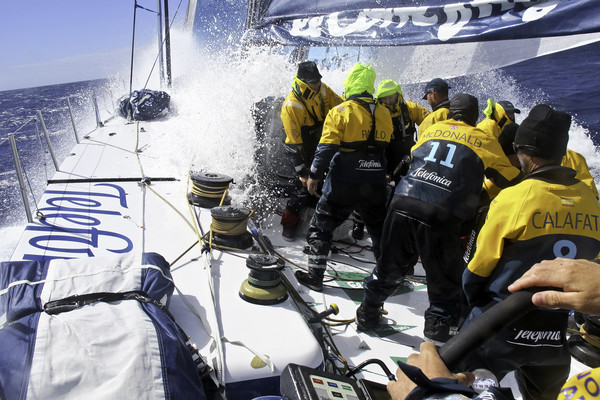The pressure is still on for Telefonica as they hitch a ride from a weather front to Cape Town
Team Telefonica have victory firmly in their sights in the opening leg of the Volvo Ocean Race. But after having the chance of victory handed to them on a plate by Puma’s de-masting, Telefonica skipper Iker Martinez will still be looking over his shoulder on the run to Cape Town. And he will also be battening down the hatches as Telefonica hopes to become the first boat to pick up a fast-moving South Atlantic cold front all the way to South Africa.
Telefonica’s peak speed has already topped 30 knots and they are ready to go even faster to shake off a late challenge from Camper.
“We’re at the beginning of a front and getting ready for the big speeds,” said Telefonica’s navigator Andrew Cape. “We’re already averaging 24 knots so it’s already getting a bit spooky. We’re preparing ourselves for a lot more than that and a full 36 hours of it.”
Although having been handed the lead by Puma’s misfortune, Telefonica’s crew will temper their need for speed with caution while at the same time taking full advantage of the front in a region where race records have been set in the past
“Clearly we don’t want to break anything but we still have to push the boat to get in on time,” said Andrew Cape. “If we delay, it just gets worse and worse. We’ve definitely got the racing sails up and going full speed.”
Although Martinez’ team were racing neck and neck with Team PUMA, when disaster struck, Martinez offered to stand by to come to the aid of his stricken rival, although this proved to be unnecessary as Puma rendezvoused with a ship to take on fuel and motor to the remote island of Tristan da Cunha.
Puma’s dismasting left Telefonica clear of the remaining two boats, with Camper 108 miles back, and French entry Groupama seemingly out of running and ready to accept a third place that never looked likely a week ago. Hitching a ride with the new weather system may prove a stretch too far for Camper who look likely to arrive just a little too late to benefit from the full effect.
Despite the healthy lead gained, Telefonica’s skipper Iker Martinez was remaining cautious over his team’s position within the race while sympathising with Puma.
“Yesterday it was made even clearer to us that the leg isn’t over until you actually cross the finishing line,” he warned.
“It wasn’t a nice feeling at all to leave our closest rivals throughout the whole leg behind like that, 2,000 miles from the nearest coast and with no mast, but we have total trust in the fact that the organisers have the situation under control.
“Now we need to think about our new rival Camper.”
“As we saw yesterday lots can happen in 2,000 miles and while this change in situation isn’t easy we’ve got to carry on, be prudent and concentrate hard on not making mistakes.”
Telefonica have followed a strategy of heading south towards the Saint Helena High, which lies in a more southern position this year.
This has forced them to cover more distance in order to catch Westerly breezes to give the team the push in the right direction needed to reach Cape Town.
However, Telefonica is watching the barometer carefully to gauge where they are in relation to the windless centre, as it is expected that they will have to gybe on Wednesday evening to avoid being becalmed.
The Spanish team are now sailing just over 1500m away from Cape Town, with computers predicting roughly 80 more hours before the boat comes into shore, with their arrival expected at some time on Saturday.
Confidence is high on board Camper that they can catch the Spaniards and a crew member said: “As you can see, it doesn’t take long for stuff to change very quickly.”
The New Zealand team are hoping to exploit a cold front that should catapult closer to Telefonica and towards Cape Town.
But it hasn’t all been plain sailing for the team in second with bowman Mike Pammenter needing surgery from on-board medic Tony Rae for a broken tooth, a gashed face and bruises after he attempted a sail change.
Skipper Chris Nicholson had to slow down to treat the bowman before regaining full speed in their chase of Telefonica.
With three boats already retired from the first leg Team New Zealand managing director Grant Dalton is aware of the risks they are taking racing so hard to try and catch Telefonica.
“This is a dangerous race and when you are sailing on the edge like this the unfortunate reality is that at times you will damage both boat and crew,’ he said. “The key thing now is that Camper is back in the game and heading hard for Cape Town and the finish”.




